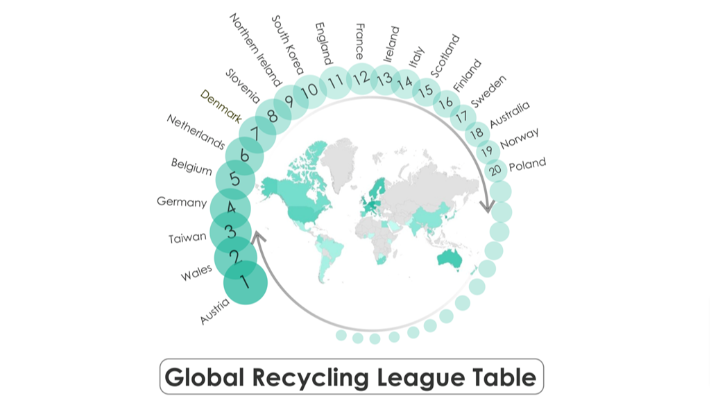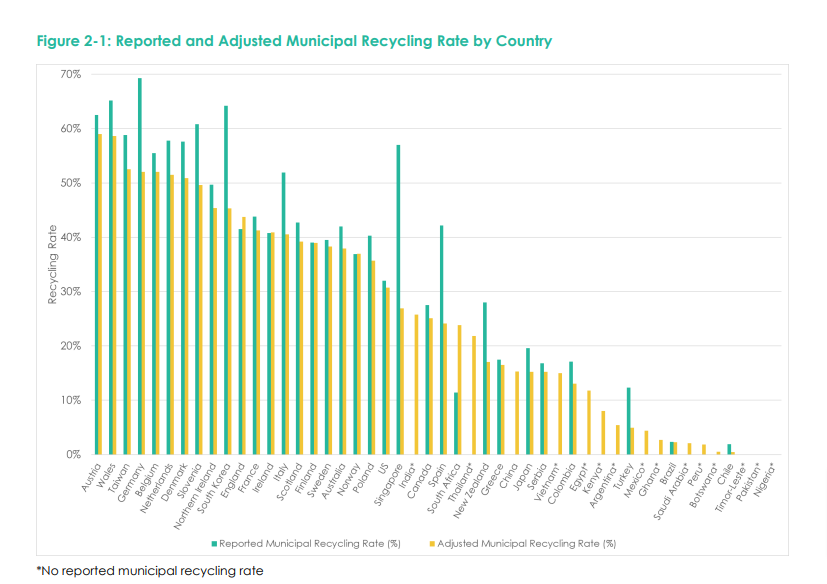

A new study by Reloop and Eunomia Research and Consulting has revealed that Austria is the world's top country for recycling materials like aluminium, steel, plastic and others. In the UK, Wales ranks 2nd globally, while Northern Ireland, England, and Scotland are ranked 9th, 11th, and 15th, respectively, among the 48 countries assessed.

Image Source - Eunomia
Global Recycling League Table – Phase One Report
The report, 'Global Recycling League Table—Phase One Report,' examines the recycling performance of countries with the highest reported recycling rates and many of the world's largest economies. It also includes lower-income countries in Latin America, Asia, and Africa to highlight global disparities in recycling practices.
Published in celebration of World Environment Day, the research was funded by TOMRA, The Welsh Government, the International Aluminium Institute, and the Can Manufacturers Institute in collaboration with Reloop. The aim was to identify and share best practices in recycling worldwide.
What the report found
The report found that the world's top recyclers do not exceed a 60 per cent recycling rate for municipal waste once differences in reporting practices are accounted for. Eight of the top ten recyclers are in Europe, with seven in Western Europe. This reflects the region's longstanding strategies and policies that have driven investments in collection, logistics, sorting, and reprocessing.
The exceptions are two East Asian nations, Taiwan and South Korea, with long-established collection and treatment systems. These findings highlight the importance of long-term investment in making recycling convenient and efficient and the significant role of establishing behavioural norms over many years to create a recycling culture.
 Image Source - Eunomia
Image Source - Eunomia
Analysis based on the recycling rates of the countries
The countries with the most significant drops in reported recycling rates were Singapore, South Korea, Spain, and Germany. Conversely, a few countries saw their performance improve or were compensated for not reporting recycling rates, with China and South Africa being the biggest beneficiaries.
Wales emerged as the highest-performing country in the UK, ranking second globally, just behind Austria. The recycling rate in Wales has increased dramatically since introducing the "Towards Zero Waste" strategy in 2010.
The strategy set long-term, escalating recycling targets for local authorities in Wales, backed by financial penalties for missing these targets. Northern Ireland also made the top ten, ranking ninth with a 45.3 per cent recycling rate. England ranked 11th with a 44 per cent recycling rate, and Scotland came in 15th with a 39 per cent recycling rate.
The study also examined the collection rates for recycling glass, metal (like aluminium), and plastic beverage containers. Although data availability was more limited, significant differences were found in the quantities of beverage containers being placed on the market, with little correlation between consumption and recycling performance.
Countries with the highest municipal waste recycling rates
Countries with the highest municipal waste recycling rates generally had reasonable beverage container collection rates. However, the countries with the most beverage containers placed on the market—such as the US for plastics and metal and Australia for glass—had relatively low 'collected for recycling' rates.
The recommendations for all countries are to implement practices observed in high-performing countries, as indicated in the points below. Additionally, in areas where informal recycling sectors are active, explore strategies for formalizing these operations to safeguard human health and the environment, enhance living standards, and bolster recycling efforts and data reporting accuracy. Other recommendations include:
Improve municipal waste and recycling reporting, including:



Responses






